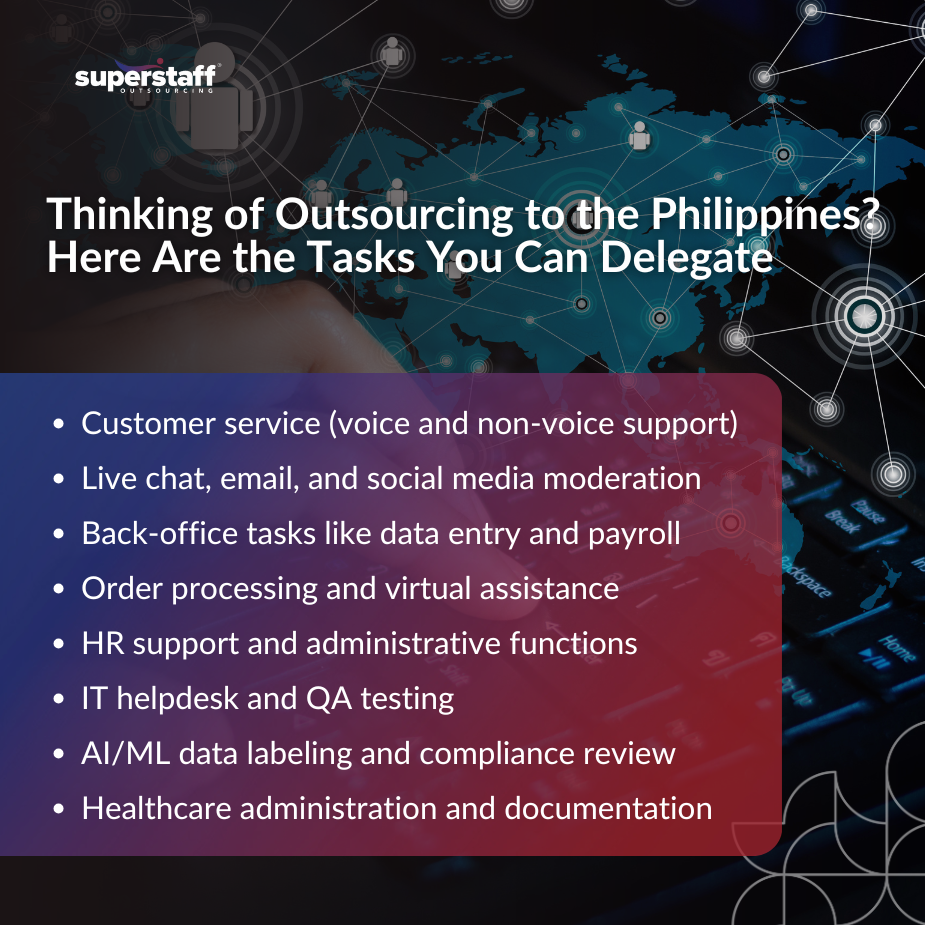
Outsourcing to the Philippines has become a go-to strategy for companies looking to streamline operations, reduce overhead, and stay competitive in a fast-moving global market. From tech startups to healthcare providers, businesses across industries are discovering that the Philippines offers more than just affordable labor—it provides access to a skilled, English-speaking workforce known for reliability and cultural alignment with Western markets.
But while the advantages are clear, the real question is what to delegate. Not every task belongs offshore, and not every role will yield the same return on investment. This blog helps business leaders cut through the noise by identifying which functions are best suited for outsourcing to the Philippines. It’s not about handing off your entire operation—it’s about outsourcing smart, focusing on the roles that deliver the most value when handled by a capable offshore team.
Customer-facing support roles are a natural fit for outsourcing to the Philippines.
Customer service is one of the strongest pillars of the Philippines’ outsourcing industry. With a reputation for empathy, patience, and professionalism, Filipino agents are a top choice for companies seeking high-quality customer experiences. Both voice and non-voice roles are in high demand, including inbound call handling, email response, live chat, and even social media moderation.
The effectiveness of Philippines customer service outsourcing is largely driven by cultural compatibility with Western audiences and high English fluency across the workforce. The country’s education system emphasizes English from an early age, and many Filipinos consume Western media, which helps with nuance and tone when speaking with U.S. and European customers. Add to this the country’s willingness to work in rotating shifts, and you get a workforce capable of delivering 24/7 support across time zones.
Industries that benefit most from outsourcing customer-facing roles to the Philippines include e-commerce, SaaS, healthcare, telecommunications, and travel. These industries require agents who not only resolve issues efficiently but also embody brand values in every interaction. With the help of business process outsourcing companies in the Philippines, these brands achieve both scale and service excellence.
But it’s not just the frontlines—behind-the-scenes operations can be just as valuable to delegate.
Back-office functions help businesses scale without overloading in-house teams.
Many business leaders overlook the power of outsourcing back-office operations. Yet these roles are foundational to smooth day-to-day functioning. Delegating repetitive but essential administrative tasks frees up internal resources, letting in-house teams focus on strategy and innovation.
Key back-office functions that are commonly outsourced to the Philippines include data entry, order processing, HR support, payroll, and virtual assistance. These tasks benefit from the process-oriented mindset and attention to detail that Filipino professionals are known for. When standardized and documented well, they become easy to transition offshore without sacrificing quality.
Logistics companies, for example, often outsource shipment tracking and billing tasks to offshore teams. Accounting firms hand off reconciliations, invoicing, and reporting. E-commerce brands delegate inventory management, fulfillment support, and product listing updates. For these companies, the return on investment goes beyond cost savings. They gain consistency, reduce errors, and get predictable output from a dedicated team.
For companies looking to stay lean and tech-forward, another category of outsourcing offers high-impact results.

Specialized and technical roles are increasingly outsourced by startups and digital-first companies.
Outsourcing to the Philippines isn’t limited to customer service and admin work. In recent years, the country has emerged as a go-to destination for specialized and technical roles. As more Filipino professionals upskill in areas like IT, data science, and digital compliance, the pool of available talent is becoming deeper and more diverse.
Roles such as IT helpdesk support, QA testing, AI/ML annotation, compliance review, and healthcare administration are increasingly being handled offshore. What’s driving this trend? Cost-effective access to tech-literate talent, high English fluency for documentation and communication, and strong process discipline.
Industries like fintech, biopharma, and healthtech are leading the charge. Startups in these sectors need to scale fast, often with limited capital, and outsourcing gives them access to skilled labor without the overhead of hiring locally. For example, a biopharma company might outsource clinical documentation management, while a fintech firm might build an offshore QA team to support rapid product rollouts.
Still, not every task should be outsourced—and knowing what not to delegate is just as important.
What you shouldn’t outsource: Mission-critical functions requiring real-time physical collaboration.
As much as outsourcing offers scale and flexibility, it’s important to draw clear boundaries. Certain roles are too strategic, sensitive, or localized to be effectively handled offshore.
Product engineering that requires physical testing and iteration, executive leadership roles that shape long-term vision, and sales operations that rely heavily on face-to-face interaction with clients are typically best kept in-house. These roles often demand on-the-ground decision-making, real-time collaboration, and proximity to customers or partners.
When considering what business tasks to outsource to the Philippines, leaders should weigh whether a function is core to their competitive advantage or more operational in nature. Core tasks, which differentiate your business in the market, are usually best kept close. Non-core tasks, which support but do not define your value proposition, are prime candidates for offshore delegation.
The key is creating a blended model that supports your in-house goals without diluting focus.
Smart outsourcing is about integration, not just delegation.
The most successful outsourcing arrangements don’t just move tasks from one team to another—they create alignment. Integration means building communication channels, setting expectations early, and treating your offshore team as a strategic partner rather than just a vendor.
At SuperStaff, we help businesses do just that. Our approach to onboarding ensures that offshore team members understand your brand, values, and processes from day one. We support the development of service level agreements (SLAs) that define success clearly. And we maintain regular communication loops to keep both sides aligned on goals and performance.
This is especially important when outsourcing to the Philippines, where a high-context communication culture makes relationships central to success. Investing in team integration boosts productivity, builds trust, and results in better outcomes.
Smart outsourcing isn’t just about reducing costs—it’s about extending your capabilities, entering new markets, and increasing organizational agility.
So, what’s the next step if you’re ready to delegate the right way?
Thinking of Outsourcing to the Philippines? Connect With the BPO Team at SuperStaff!
Outsourcing to the Philippines can offer exceptional ROI—but only if you delegate the right tasks. By focusing on customer service, back-office support, and specialized technical roles, companies can free up internal resources while improving efficiency and service quality. At the same time, maintaining core functions in-house ensures strategic continuity.
Business process outsourcing companies in the Philippines, like SuperStaff, are built to support smart delegation. From training to quality assurance, we partner with you every step of the way to build high-performing offshore teams.
Looking to build a high-performing offshore team? Contact SuperStaff today for a personalized consultation on what’s worth delegating.






